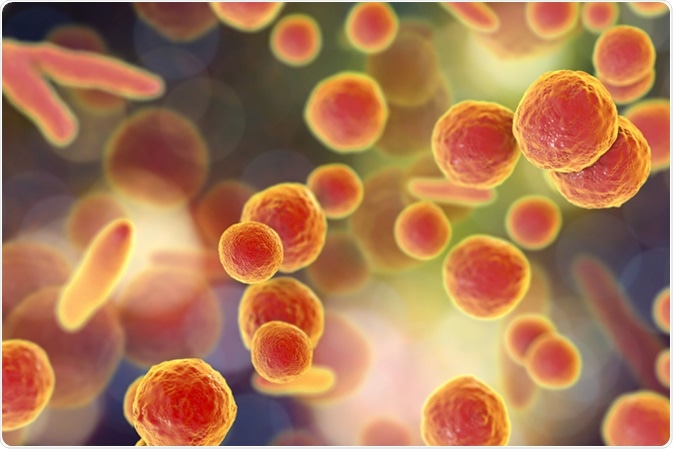Genital mycoplasmas are intriguing and widespread microorganisms without cell walls, which is a trait that renders them innately resistant to all antibiotics that target this structure. They are also typified by smaller genomic and cellular sizes in comparison with other bacteria, and are thought to be the smallest organisms that are capable of autonomous replication.
Of the seven mycoplasmas that have been found in the genitourinary tract, only three are clearly linked with certain clinical syndromes (notably Ureaplasma urealyticum, Mycoplasma hominis and Mycoplasma genitalium). Nevertheless, the rise of molecular diagnostic methods is enhancing our knowledge of other potential pathogenic species that may be of a fastidious nature (such as Mycoplasma fermentans and Mycoplasma penetrans).

Mycoplasma bacteria, 3D illustration showing small polymorphic bacteria which cause pneumonia, genital and urinary infections. Image Credit: Kateryna Kon / Shutterstock
Common Clinical Syndromes in Men
Genital mycoplasmas are commonly associated with non-gonococcal urethritis in men, although their exact role in this condition is still debated. Ureaplasma urealyticum is often implicated as a primary cause, and studies have shown that the initial introduction of this mollicute into the urethra results in urethritis, whereas subsequent invasions result only in colonization without the clinical disease.
Furthermore, Mycoplasma genitalium is highly specific for men with non-gonococcal urethritis, and also linked to a high-grade urethritis that is defined as more than ten polymorphonuclear neutrophils per high-power microscopy field. This pathogen is also considered a cause of recurrent or persistent urethritis in certain instances, mostly due to its antimicrobial resistance.
One study has also shown the role of Mycoplasma genitalium in the inflammation of the glans and the foreskin, also known as balanoposthitis. It may also cause epididymitis. Conversely, although a frequent inhabitant of the male genital tract, Mycoplasma hominis is not a cause of non-gonococcal urethritis, balanoposthitis or any other clinical presentation of this sort in men.
Several studies have implicated Ureaplasma urealyticum, Mycoplasma hominis and Mycoplasma genitalium in prostatitis syndromes. For example, the latter pathogen was found in 4% of prostatic biopsies in men with chronic idiopathic prostatitis. Still, there is a considerable controversy around this issue, and thus far the role of mycoplasmas in prostatitis seems to be minimal.
The Influence on Male Fertility
The current estimates are that approximately 15% of male infertility can be related to genital tract infection – and Ureaplasma urealyticum is leading the way among the causative agents. The presence of Ureaplasma urealyticum could provoke a dysfunction of the accessory sex glands with abnormal secretions that lead to a change in the characteristics of the semen.
Recent studies point to the detrimental effects of Ureaplasma urealyticum on the sperm parameters, as its presence may reduce mean sperm concentration, the vitality of spermatozoa, their progressive motility, as well as semen density. Moreover, infection with Ureaplasma urealyticum is associated with lower semen pH value and higher seminal viscosity.
Similar effects are observed when Mycoplasma hominis is present in the male genital tract. Although this particular mycoplasma does not give rise to urethritis or some other clinical syndromes, it can influence semen parameters, and thus it is linked to abnormal morphology of spermatozoa and low sperm concentration.
A point requiring emphasis is that sequential sectioning revealed that spermatozoa infected with Mycoplasma hominis harbor this pathogen intracellularly within cytosolic spaces of both head and midpiece regions, which means that this type of interaction may result in subtle damage of spermatozoa and diminish long-term fertility.
More research is needed regarding the effect of Mycoplasma genitalium on semen parameters and, subsequently, male infertility. Its capability to attach to human spermatozoa has been demonstrated by X-ray microscopy, but published studies show contradictory conclusions.
References
- http://www.antimicrobe.org/m06.asp
- http://jcm.asm.org/content/42/10/4636.full
- https://www.ncbi.nlm.nih.gov/pubmed/17401188
- https://www.hindawi.com/journals/jpath/2014/183167/
- https://www.ncbi.nlm.nih.gov/pmc/articles/PMC2564705/
- http://journals.sagepub.com/doi/abs/10.1258/0956462021924695?journalCode=stda
- Blanchard A, Bébéar CM. Mycoplasmas of Humans. In: Razin S, Herrmann R, editors. Molecular Biology and Pathogenicity of Mycoplasmas. Springer Science & Business Media, 2007; pp. 45-72.
- Mendoza N, Ravanfar P, Shetty AK, Pellicane BL, Creed R, Goel S, Tyring SK. Genital Mycoplasma Infection. In: Gross G, Tyring SK, editors. Sexually Transmitted Infections and Sexually Transmitted Diseases. Springer Science & Business Media, 2011; pp. 197-202.
Further Reading
Last Updated: Feb 26, 2019